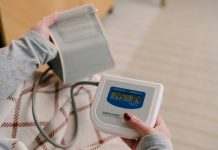
High blood pressure, also known as hypertension, is a condition that sneaks up on you. Often called the “silent killer,” it typically doesn’t cause noticeable symptoms.
However, many people with high blood pressure report feeling unusually tired or fatigued.
This connection between high blood pressure and fatigue might not be immediately obvious, but understanding it can help manage both conditions more effectively.
Blood pressure is the force exerted by circulating blood on the walls of blood vessels.
When this pressure is consistently too high, it puts extra strain on the heart and arteries, which can lead to serious health issues over time. But how does this relate to feeling tired all the time?
First, it’s crucial to understand that fatigue – a lingering tiredness that’s constant and limiting – can stem from various sources, including lifestyle factors, mental health issues, and chronic conditions like high blood pressure.
While high blood pressure itself might not directly cause fatigue, the strain it puts on your cardiovascular system can lead to feelings of tiredness.
One reason is the heart’s increased workload. When blood pressure is high, the heart must work harder to pump blood through the arteries.
Over time, this extra effort can make you feel tired or fatigued because your body is essentially working overtime.
Additionally, the side effects of medications used to treat high blood pressure can include fatigue, making it a common complaint among those managing the condition.
Research evidence supports the link between high blood pressure and fatigue, although the connection is often indirect.
A study published in the Journal of Hypertension found that people with high blood pressure were more likely to report symptoms of fatigue and low energy. Another aspect is the role of sleep disturbances.
High blood pressure is associated with conditions like sleep apnea, where breathing stops and starts during sleep, leading to poor sleep quality and, consequently, daytime tiredness.
Furthermore, high blood pressure can affect the kidneys’ ability to filter blood effectively, leading to fluid retention and increased fatigue.
The relationship between the cardiovascular system and energy levels is complex, with each influencing the other in various ways.
Managing high blood pressure is crucial, not only to reduce the risk of heart disease and stroke but also to improve overall quality of life, including energy levels.
Lifestyle changes such as a healthy diet, regular physical activity, limiting alcohol intake, and reducing stress can help manage blood pressure and may also improve feelings of fatigue.
It’s also important to consult with a healthcare provider to find the right medication and dosage, minimizing side effects like tiredness.
In conclusion, while high blood pressure may not be the direct cause of fatigue, the strain it places on the heart and the body’s overall health can lead to feelings of tiredness.
The connection highlights the importance of managing blood pressure not just to prevent cardiovascular diseases but also to enhance daily energy levels and overall well-being.
Regular check-ups, lifestyle modifications, and proper medication management are key strategies in controlling high blood pressure and reducing fatigue, helping individuals lead more energetic and fulfilling lives.
If you care about blood pressure, please read studies about unhealthy habits that could increase high blood pressure risk, and eating eggs in a healthy diet may reduce risks of diabetes, high blood pressure.
For more information about blood pressure, please see recent studies that early time-restricted eating could help improve blood pressure, and results showing 12 foods that lower blood pressure.
Copyright © 2024 Knowridge Science Report. All rights reserved.



